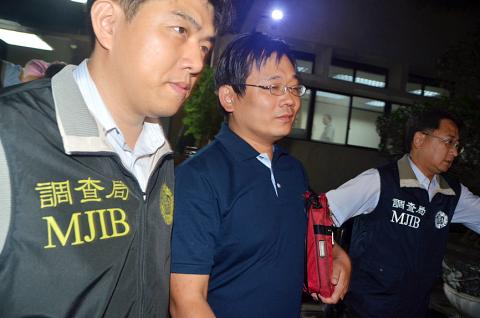Win Semiconductors Corp (穩懋半導體) yesterday said investigators suspect some of its former and current engineers of involvement in the theft of corporate secrets, some of which were sent on to Chinese rival Chengdu Gastone Technology Co (成都嘉石).
The investigation is the latest in a slew of trade-secret thefts linked to the nation’s technology companies, after employees of handset chipmaker MediaTek Inc (聯發科) pleaded guilty of stealing personnel information to be used in talent poaching last month.
Win Semi called on rivals to stop stealing trade secrets, poaching talent or employing any other unfair competition practices, the company said in a filing with the Taiwan Stock Exchange.

Photo: Cheng Shu-ting, Taipei Times
More than 50 investigators yesterday raided 12 locations, including the offices and homes of seven former and current employees of Win Semiconductors, and have seized important evidence, the Ministry of Justice Investigation Bureau said in a statement.
“Investigators found seven suspects, led by one surnamed Yang (楊), have passed information on key technologies developed by Win Semiconductors to its Chinese rival, Chengdu Gastone,” an investigator said on the telephone.
Chengdu Gastone approached former Win Semiconductors employees and its equipment suppliers via headhunting agencies to obtain trade secrets and key technology information, said the investigator, who declined to be named.
The Chinese semiconductor company offered bribes and jobs in exchange for valuable technology information, the bureau said in the statement.
Yang and other suspects were offered positions at Chengdu Gastone and they were set to leave Taiwan for China on Monday, the bureau added.
Win Semiconductors is the world’s largest foundry services provider of gallium arsenide components used in mobile phones. The Linkou (林口), Taoyuan-based firm has become a target of Chinese rivals as they aggressively expand their reach in the supply chain of the semiconductor industry, the statement said.
China plans to build new factories to produce gallium arsenide components in Beijing, Chengdu and Fuzhou, the bureau said, citing information it obtained.
Two months ago, Win Semiconductors told the Taoyuan District Court that it had found several employees had illegally duplicated and stored certain secret technology information. The company told the court at the time that it was highly concerned about possible leakage to rivals.
Win Semiconductors reported net income of NT$805 million (US$24.6 million) for last quarter, up 30 percent from a year earlier and 83 percent from the previous quarter, with earnings per share of NT$1.32. In the first three quarters, cumulative earnings per share reached NT$2.81, while revenue totaled NT$9.87 billion in the first 10 months of the year, up 20.11 percent from a year earlier.
The company yesterday said its operation would not be affected by the latest investigation.
Last month, management forecast revenue for this quarter to increase by high single digits from last quarter’s NT$2.913 billion with a stable gross margin, saying that inventory correction would gradually come to an end, and citing emerging signs of stabilizing demand from wireless, cellular and infrastructure segments.
Win Semiconductors shares plunged 3.43 percent to NT$46.5 yesterday, under-performing the TAIEX, which declined 1.77 percent.

Semiconductor shares in China surged yesterday after Reuters reported the US had ordered chipmaking giant Taiwan Semiconductor Manufacturing Co (TSMC, 台積電) to halt shipments of advanced chips to Chinese customers, which investors believe could accelerate Beijing’s self-reliance efforts. TSMC yesterday started to suspend shipments of certain sophisticated chips to some Chinese clients after receiving a letter from the US Department of Commerce imposing export restrictions on those products, Reuters reported on Sunday, citing an unnamed source. The US imposed export restrictions on TSMC’s 7-nanometer or more advanced designs, Reuters reported. Investors figured that would encourage authorities to support China’s industry and bought shares

FLEXIBLE: Taiwan can develop its own ground station equipment, and has highly competitive manufacturers and suppliers with diversified production, the MOEA said The Ministry of Economic Affairs (MOEA) yesterday disputed reports that suppliers to US-based Space Exploration Technologies Corp (SpaceX) had been asked to move production out of Taiwan. Reuters had reported on Tuesday last week that Elon Musk-owned SpaceX had asked their manufacturers to produce outside of Taiwan given geopolitical risks and that at least one Taiwanese supplier had been pushed to relocate production to Vietnam. SpaceX’s requests place a renewed focus on the contentious relationship Musk has had with Taiwan, especially after he said last year that Taiwan is an “integral part” of China, sparking sharp criticism from Taiwanese authorities. The ministry said

US President Joe Biden’s administration is racing to complete CHIPS and Science Act agreements with companies such as Intel Corp and Samsung Electronics Co, aiming to shore up one of its signature initiatives before US president-elect Donald Trump enters the White House. The US Department of Commerce has allocated more than 90 percent of the US$39 billion in grants under the act, a landmark law enacted in 2022 designed to rebuild the domestic chip industry. However, the agency has only announced one binding agreement so far. The next two months would prove critical for more than 20 companies still in the process

CHANGING JAPAN: Nvidia-powered AI services over cellular networks ‘will result in an artificial intelligence grid that runs across Japan,’ Nvidia’s Jensen Huang said Softbank Group Corp would be the first to build a supercomputer with chips using Nvidia Corp’s new Blackwell design, a demonstration of the Japanese company’s ambitions to catch up on artificial intelligence (AI). The group’s telecom unit, Softbank Corp, plans to build Japan’s most powerful AI supercomputer to support local services, it said. That computer would be based on Nvidia’s DGX B200 product, which combines computer processors with so-called AI accelerator chips. A follow-up effort will feature Grace Blackwell, a more advanced version, the company said. The announcement indicates that Softbank Group, which until early 2019 owned 4.9 percent of Nvidia, has secured a